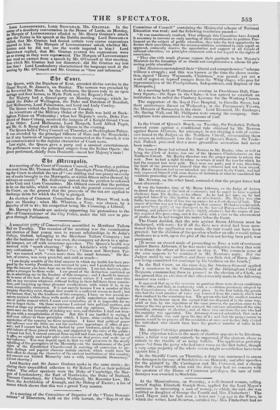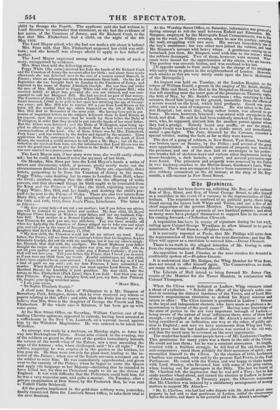At the Mansionhouse, on Saturday, a well-dressed woman, calling herself
Sophia Elizabeth Guelph Sims, applied for the Lord Mayor's assistance in recovering a sum of money, to which, she said, she was entitled as daughter of George the Fourth and Mrs. Fitzherbert ! The Lord Mayor said he had seen a letter not long ago in the Times, in which the writer, Lord Stourtoo, certified that Mrs. Fitzherbert had no
child by George the Fourth. The applicant said she had written to Lord Stourton to contradict that statement, as she had the evidence of her nurse, of the Countess of Jersey, and Sir Richard Croft, to the fact that Mrs. Fitzherbert had a child, on the night of the 4th May 1802. The Lord Mayor asked, why she bad not made a stir about it before? Mrs. Sims said, that Mrs. Fitzherbert supposed her child was still- born ; and she herself was always afraid to apply to her father or mother.
The Lord Mayor expressed strong doubts of the truth of such a story, unsupported by evidence.
Mrs. Sims then told the following story— Peggy White (the nurse) received her from the hands of Sir Richard Croft and the Countess of Jersey the moment after her birth ; and about three weeks afterwards she was delivered over to the care of a woman named Boswell, M France ; where an attempt was made to assassinate them both. On the 1st of September she was brought back to London to the Countess of Jersey, and
baptized in the name of Sophia Elizabeth Guelph. She was then put under
the care of Mrs. Hill, sister to Peggy White and wife of Captain Hill; who received 2,000/. to adopt her,provided she was not claimed, and was com- manded to call her Margaret Hill. She had received no part of that money. The Countess of Jersey left in the hands of Lord Rivers, who was subsequently
found drowned, 1,000/. to be paid to her upon her attaining the age of twenty- one years; and Mrs. Hill was to receive 501. a year from Lord Rivers or his
heirs, till she reached that age, which happened on the 4th of May 1815. Mrs. Hill died in November of the same year. She having beenput in pos session of important letters on the subject, delivered them to Lord Rivers, at his request, upon his assurance that he would lay them before the Duke of Wellington, in order that they should be put into the hands of her royal father. But the letters were detained ; and the Duke of Wellington, upon being ap- plied to afterwards on the subject, declared that he had never received any communications of the kind. One of these letters was for Mrs. Fitzherbert, Park Lane ; and was written by the doctor and signed by the minister. Upon application for the correspondence to Lady Rivers, after the death of Lord. Rivers, site received a verbal message to call upon a Mr. Haye ; but all the sa- tisfaction she received from him, was the information that Lord Rivers was too much the gentleman not to give the letters to the Duke of Wellington. She was now married to a journeyman baker.
The Lord Mayor said, if her story were true, she would easily obtain aid ; but he could not himself solve the mystery of her birth.
On Monday, Mrs. Sims put into the Lord Mayor's bands a series of letters and documents, which, if genuine, pretty nearly make out the circumstances detailed in the above story. There are, especially, three letters, purporting to be from the Countess of Jersey to the nurse, Peggy White,—one desiring her to come to London from Hull, where she lived ; another, stating that the child was the offspring of noble parents, and that aboveaall things its birth ought to be concealed from the King and the Princess of Wales ; the third, enjoining secrecy on Peggy White, Mrs. Hill, and her family, and desiring the child'spor- trait to be sent to the Prince of Wales. There are also two letters from Mary Hill, wife of the Captain Hill mentioned above, dated October the 14th and 18th, 1815, from Ann's Place, Limehouse. The latter is as follows- " My dear young lady—I am not your mother; but if you follow my advice, you will be restored to your father and mother. My dear child, bus Royal Highness Prince George of Wales is your father, and not my husband, Cap- tain Hill. Your mother is a Renton Catholic lady. She thought you, my dear Princess, for such you arc, was still-born. You was three months old when her Ladyship the Countess of Jersey obliged me to take you and adopt you, and call you by the name of Margaret Hill; for that was the name of my daughter that died at Hull, January 11,1798. " My dear child, the Countess would not let me retract my word. Your father, the Prince, will see from the Countess's letters that his daughter, Sophia Elizabeth Guelph, did not die with the smallpox, but it was my niece's daugh- ter, Hannah, that died with the smallpox. His Royal Highness your father thought the corpse of my niece's daughter was you, my dear child. Oh, do not let your mother and her priest make you a Roman Catholic ; if you do, God will not love you. Tell your father, the Prince, that I loved you as much as if you were my child from my womb. Fearful misfortunes, my dear child, I have been exposed to on your account. I have felt from that day as if I had a load of guilt on my soul ; yet, my dear Princess, I have committed no murder. When death closes my eyes, you must apprize Lord Rivers, No. 17, Hertford Street ; his Lordship is your guardian. My dear child, take the letters to Mrs. Fitzherbert (Park Lane) when I am dead. God bless you, my dear Princess. Forgive me, Almighty God, and you, my dear, dear Princess. Oh, forgive your dying wretched nurse. " I am your nurse, 4‘ MARY HILL. " To Sophia Elizabeth Guelph."
A short note from the Duke of Wellington to a Mr. Simpson of Barnsbury Park, Islington, denies that he ever received any letters or papers relating to this affair ; and adds, that the Duke has no reason to believe that Mrs. Sims is the daughter of George the Fourth and Mrs. Fitzherbert. If the whole case is fabulous, it has been got up with some pains.
At the Bow Street Office, on Saturday, William Carrier, one of the leading Chartist agitators, appeared in custody, having been arrested at a coffeehouse in the New Cut, Lambeth, on a warrant issued against him by the Wiltshire Magistrates. He was ordered to be taken into Wiltshire.
An attempt was made by a madman, on Monday night, to force his way into Buckingham Palace. About nine o'clock in the evening, one of the soldiers on guard in that part of the garden immediately beneath the terrace of the north wing of the Palace, saw a man ascending the steps of the terrace ; who, when challenged, said " It's all right." The soldier, supposing he was employed iu the garden or the kitchen, let him pass on. He then went towards the glass door, leading to the in- terior of' the Palace ; when one of the female servants screamed out to the soldier to seize hint. He was immediately apprehended, and given over to the custody of the Police ; when he began to curse the Queen and apply vile language to her Majesty—declaring that he intended to . have killed her, for that no Protestant ought to sit on the throne of England. It was with difficulty that the Policemen could hold him, for he was a very muscular man, and quite a maniac. On Tuesday, after a private examination at Bow Street, by Sir Frederick Roe, he was sent to Tothill Fields Bridewell.
All the parties implicated in the gold-dust robbery were, yesterday, finally committed from the Lambeth Street Office, to take their trial at the next Sessions. At the Worship Street Office, on Saturday, information was givenof daring attempt to rob the mail between Enfield and Edmonton. 111: Simpson, employed by the Metropolis Road Commissioners, was in his gig on the road, on Friday evening, when he saw the postboy, carrying the mail, struggling with two men. His servant immediately ran to the boy's assistance ; but two other men joined the robbers, and beat Mr. Simpson's servant with heavy whips. A gentleman coming up on horseback just then, Mr. Simpson went with him to the rescue ; when the robbers decamped. Two of them, however, were secured. War- rants were issued for the apprehension of the others, who are known. The postboy was severely beaten, and was confined to his bed. [It appears unsafe to trust mail-bags to the charge of the striplings who carry them to places in the neighbourhood of London. However, such attacks as this are very rarely made upon the Davie Mailsettert; of the Metropolis.] An inquest was held on Tuesday, at the London Hospital, on the corpse of William Gould, a groom in the employ of Mr. Smith, distiller, in the Mile-end Road, who died in the Hospital on Monday last. Gould was left standing near the outer gate of the premises on Thursday night, the 30th of May, by Mr. Smith's coachman ; who, returning in a few minutes, found him lying on the ground, insensible from the effects of a severe wound on the head, which bled profusely. Gould was quite sober, and was a man of temperate habits. He was taken to the Lon- don Hospital ; but next day, being rather better, was allowed to go home. He soon, however, returned ; was seized with erysipelas in the head, and died. He said he had been suddenly attacked by three Irish. men, who, he supposed, mistook him for another person against whom they had a grudge. Nobody heard any scuffle, or saw the attack; though Gould was knocked down in a public street, and immediately under a gas-light. The Jury, directed by the Coroner, recorded a special verdict, stating the facts as far as they were known.
The den of a gang of robbers, in New Street, Tyer Street, Vauxhall, was broken open on Sunday, by the Police ; and several of the gang were apprehended. A considerable amount of property was found in i
the premises, and one of the men had 68 sovereigns in his pocket: two trunks full of skeleton-keys and various other implements used by house-breakers, a dark lantern, a pistol, and several percussion-caps were found. The prisoners and property were removed by the Police in two hackney-coaches to the Station-house, Gardener's Lane, West- minster. These men are supposed to instant, been concerned in an exten- sive robbery committed on the 2d nstant, at the shop of Mr. Rey- naulds, a silk-mercer in New Bond Street.



























 Previous page
Previous page